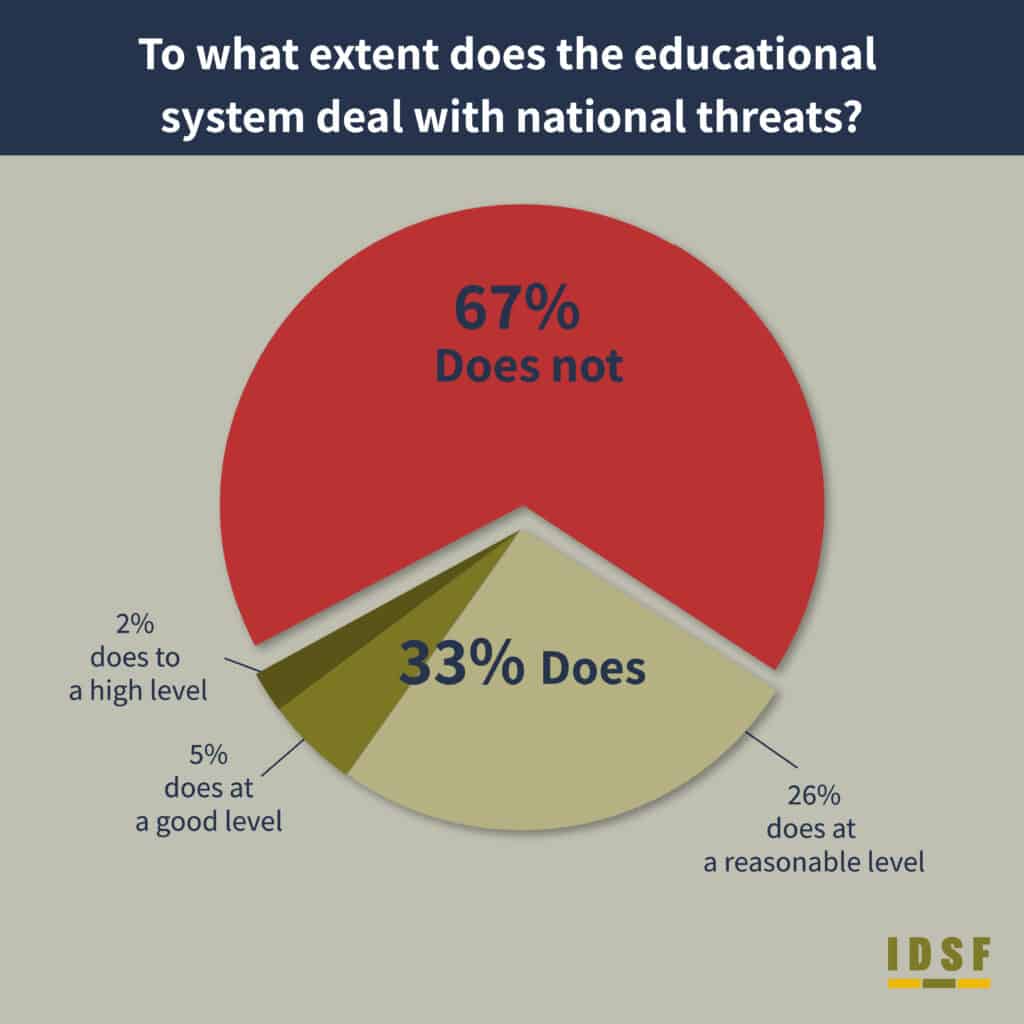The IDSF HaBithonistim Index is an ongoing gauge of the sentiments among Israeli public on issues of security, military and society. The current index focuses on education – a cause that is at the top of the priority list for the IDSF HaBithonistim movement, as it constitutes a cornerstone of Israel’s national security. The survey presented various questions relating to, among others, subjects in the school curriculum, the responsibilities of the educational institutions, and the role of the educational system in shaping the identity of the individual and the collective.
The previous survey touched upon the values that the public believed should be instilled in Israel’s school students in Israeli schools, their pedagogical content, and the manner in which the education system prepares students for their professional and civic lives. The present survey explores the correlation between education and security and the role of Israeli high schools in preparing their students for military service.
The survey was conducted during September 2024 under the academic guidance of Dr. Ronen Itzik and with the statistical guidance of Dr. Hagai Elkayam. The survey was conducted among 1,611 respondents from the adult population in Israel (18+) who use the Internet, and was monitored to ensure appropriate representation in terms of age, gender, nationality, religious and political affiliation.
For the combined sample (1,611 respondents), the maximum margin of sampling error is ±2.5% with a probability of 95%; For the Jewish sample (1,354 respondents), the maximum margin of sampling error is ±3% with a probability of 95%; For the Arab sample (257 respondents), the maximum margin of sampling error is ±6.2% with a probability of 95%.
To teach or not to teach? Topics of national security in pedagogical curriculums
The IDSF HaBithonistim movement strongly believes that education is a fundamental building block in a robust national security and a crucial element in the shared ethos of Israeli society – both of which are vital for Israel’s existence in the Land of Israel. This part of the survey aims to examine whether Israeli public also identifies the correlation between education and security.
According to the results, 93% of the Jewish respondents, and 86% of all respondents, agree with the statement that education is a cornerstone of Israel’s national security. Furthermore, 90% of Jewish respondents and 83% of all respondents agree with the statement that the education system plays a decisive role in shaping the national ethos.


With the belief in the tight relationship between education and security, and on the backdrop of the imperative to build an ethos of a society that steps up to the flag and all walks of life serve in the army and honor those who serve in the security forces – the IDSF HaBithonistim movement believes that it is the duty of Israel’s educational system to provide its students with knowledge regarding the strategic threats and other issues of national security. These are explored as well in the present study.
The respondents were asked to what extent they thought the Israel’s educational system deals with the current security threats. 62% of the respondents thought that the educational system does not deal at all or deals to a small extent with the security threats Israel is facing. 26% thought that the system does deal with this subject to a reasonable extent, 5% thought that the topic is addressed to a satisfactory extent while only 2% thought that the educational system deals with the topic of security threats to a great extent.

The respondents were also asked whether they thought it was important for the educational system to add to the educational program lessons on critical issues to Israel’s national security such as the multi-arena threats Israel is facing, the Iranian threat and the Israeli-Palestinian conflict. 86% of the respondents – Arab and Israeli participants all together – thought it was important to add this subject matter to the curriculum, while 40% of them thought this was crucial.
“The findings of the survey cast a very scathing light on the inadequacy of the preparation Israel youth receives in school for the unique life challenges that life in Israel presents, and in particular, the critical life-stage most of them are expecting – service in the Israeli Defense Forces”, argues Colonel (res.) Dr. Ronen Itzik. “The lack of knowledge in regard with the security challenges that ring Israel inherently impedes the understanding of the significance of military service, and at that enlistment into combat service. This is not congruent with the existing reality in Israel, in which only half of Israeli youth complete their mandatory military service, especially in the current reality with which Israel is dealing”.

In the State of Israel, most high school graduates enlist in military service in a very short while after finishing school. This means that the only reasonable time to prepare them for their military service is during high school. This survey explored public opinion on whether high schools should indeed be tasked with this undertaking, and what would be the most effective preparatory programs.
Results show that 95% of the Jewish participants thought that high schools should offer to some extent preparatory content and only 5% thought they shouldn’t. Of those who supported this idea, nearly 50% thought that high schools should deal with this matter to a large extent.

The participants were then asked to select which activities they deemed most appropriate for inclusion in preparatory programs. Most respondents thought that excursion and history and heritage tours were most important – selected by 70%. This was followed by meetings with serving school graduates (47%); youth movement activities (39%); one-week military youth (GADNA) program (35%) and lectures and talks by security and military personnel (34%).
“Preparation for meaningful military service begins in high school, and schools that shirk this responsibility are first and foremost hurting their students by not letting them gain the knowledge and tools that are crucial for the next phase of their life”, says chairman of the IDSF HaBithonistim Brigadier General Amir Avivi. “We in the IDSF HaBithonistim movement try to help with this and prepare young men and women for their military service, and hold seminars on security issues and history and heritage excursions tailored for youth”.

Education is indeed a cornerstone of security: conclusions
In order to ensure the security of Israel, Israeli society must be one that serves in the army. However, this notion is not a call to focus on the collective and security concerns alone. The IDSF HaBithonistim movement’s aspiration is for a society that is “between Athens and Sparta”. In other words, a society with a rich culture that promotes education on one hand, and on the other – an ideological society that is willing to make personal sacrifices for the sake of the collective.
Since the educational system is the agent that shapes the future generation of Israeli citizens, it should also be responsible for providing knowledge and instilling values. However, the survey shows that oftentimes, it falls short of fulfilling this duty.
This understanding had led the IDSF HaBithonistim movement to add education to its list of activities. Members of the movement frequently meet with high school students and students in pre-military preparatory programs, conduct heritage tours for youth, and give lectures and meetings on issues of national identity and security. The movement is also currently working on establishing a new pre-military preparatory school called “Tekuma,” which will be established in the settlement of Tekuma in the Gaza envelope, and will focus on Zionist values, connection to the Land of Israel, and the instillation of a national Zionist ethos.








